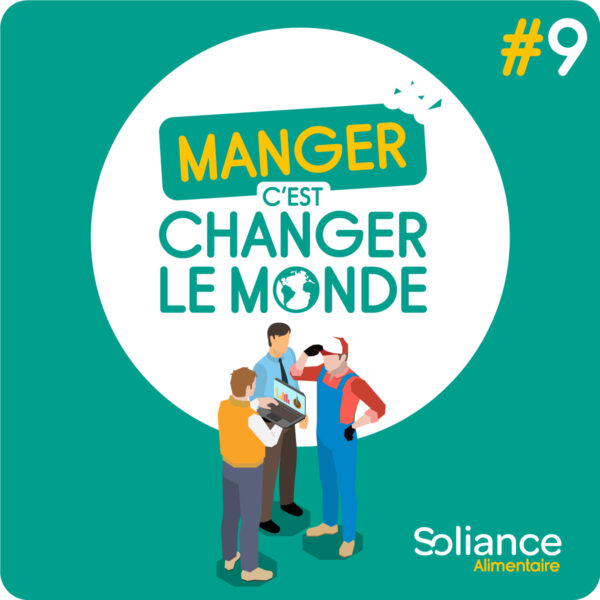Manger, c’est changer le monde, la série de podcasts qui décode les systèmes alimentaires – Épisode 9
Nous parlons, depuis plus d’un an maintenant, des filières productives, des distributeurs, de l’aménagement du territoire et de tous les rouages d’une organisation destinée à nourrir non seulement notre pays, mais plus largement le monde.
Il demeure, pourtant, une part d’ombre, non explorée par nos différents consultants : c’est celui des interprofessions qui se trouvent à la croisée de ces mondes et dont le rôle ne se résume pas seulement à la promotion, bien au contraire.
Dans cet épisode du podcast « Manger, c’est changer le monde », Henri Bouillot, directeur général de Soliance Alimentaire, nous éclaire sur ces organismes interprofessionnels qui jouent un rôle primordial dans les filières agroalimentaires.
Notre cabinet s’engage à tous les niveaux de la chaîne d’approvisionnement de la fourche à la fourchette. Nous sommes fréquemment sollicités par des organisations transversales aux filières, communément appelées interprofessions.
Les interprofessions sont rigoureusement encadrées par les réglementations européennes, au sein de ce que l’on nomme l’Organisation Commune des Marchés, ou OCM. Leur principale mission est de faciliter la communication entre les acteurs d’une même chaîne d’approvisionnement, promouvant ainsi les bonnes pratiques et la transparence du marché.
Au travers de nos accompagnements, nous vous partagerons les enseignements tirés. Puis, nous explorerons comment les interprofessions peuvent contribuer à renforcer la compétitivité et le dynamisme d’une filière, tout en abordant leurs éventuelles limites.
Les facteurs de réussite des filières prospères : comment les interprofessions les dynamisent ?
Le défi majeur rencontré par une filière est sa compétitivité à l’échelle française, européenne, voire mondiale. Plusieurs facteurs essentiels sont à considérer et largement reconnus par les experts en stratégie, notamment :
- L’intensité concurrentielle.
- La capacité de l’environnement local à favoriser l’ouverture au marché mondial.
- La manière dont les contraintes imposées par le territoire ou la filière sont perçues, soit comme des opportunités, soit comme des obstacles.
Ces facteurs jouent un rôle important dans le dynamisme et l’innovation au sein d’une filière. Nous avons réalisé une étude pour FranceAgriMer, il y a de cela quelques années, portant sur les dynamismes des AOP fromagères, toutes dotées d’une interprofession. Elle a démontré comment sont organisées les filières qui prospèrent :
- Les acteurs avaient une identité forte et partagée, centrée autour d’un projet commun.
- Les acteurs en amont, notamment les agriculteurs, étaient profondément engagés dans le projet, prêts à contribuer activement à sa création, sa défense et sa valorisation.
- Les acteurs en aval étaient fortement attachés au territoire et au développement de leur filière.
- Une bonne gouvernance.
Ces ingrédient réunis, dynamisent les filières comme le Comté, reconnue pour sa prospérité. A contrario, certaines ont plus de difficultés car les conditions du succès ne sont pas forcément en place.
Il est donc essentiel de se demander dans quelle mesure l’interprofession peut jouer un rôle dans ces défis et sous quelles conditions.
Les différents niveaux d’intervention des interprofessions : exemples concrets
Les niveaux d’intervention des interprofessions sont variés et complexes. La première approche est celle du marché : comment les acteurs vont pénétrer le marché, promouvoir leurs produits et les défendre par exemple. Ensuite, il existe des niveaux d’intervention plus ciblés.
Prenons l’exemple des organisations de producteurs de fruits en Auvergne Rhône-Alpes, qui ne sont pas des interprofessionnels, mais rattachés à l’interprofession des fruits et légumes (INTERFEL). Ils se sont rassemblés pour aborder collectivement la question de l’accès à l’eau. L’avenir de leur production en dépend. À ce niveau local, l’interprofession a joué son rôle primordial en plaidant auprès des autorités publiques sur ces enjeux liés à l’eau.
Nous pouvons prendre en exemple, également, notre travail pour l’interprofession des fruits et légumes transformés, ANIFELT. Nous les avons aidés à redéfinir leur projet et leur gouvernance. Il est apparu que cette filière, notamment en ce qui concerne les légumes industriels, était confrontée à une diminution constante de sa valeur au fil des années, sans qu’aucune initiative ne soit entreprise pour reconquérir de la valeur.
C’est à ce moment-là qu’a émergé l’idée qu’il était impératif de développer un projet de reconquête de valeur via l’innovation, la mobilisation des acteurs et de la distribution. Il faudra patienter quelques années avant d’avoir des résultats concrets.
Un autre exemple pertinent concerne l’interprofession des producteurs de lait de Brebis, dans les Pyrénées. Cette interprofession connaît des difficultés à impliquer les producteurs et à exiger d’eux une forte prise de position ce qui se conclut par une position secondaire face aux acteurs dominants de la filière.
Chaque filière a ses propres spécificités, et chaque interprofession doit élaborer une stratégie adaptée à ses besoins particuliers.
Notre rôle, chez Soliance, consiste à mobiliser tous ces éléments au service du dynamisme de la filière dans son ensemble.
Accompagnement sur mesure : comment Soliance Alimentaire renforce les interprofessions
La clé de notre accompagnement est l’écoute active des acteurs composants les interprofessions, car ils connaissent les défis que les filières vont devoir relever.
Il est indispensable que les femmes et les hommes qui composent cette interprofession expriment leurs besoins futurs, les leviers qu’ils souhaitent privilégier, les défis qu’ils doivent relever, et la raison pour laquelle ils sont unis. C’est l’étape fondamentale qui permettra de construire un projet politique clair, enthousiasmant et largement partagé par ses membres. Sans ces bases solides, le projet perdra de sa puissance.
Un exemple concret de ce processus est actuellement en cours avec l’interprofession du Gruyère en Suisse, qui compte 1 800 éleveurs, 150 laiteries et 11 affineurs.
Ce projet ambitieux intègre les grands défis de notre époque. Sa vision est claire : créer de la valeur pour chacun des maillons de la filière. Lors d’un séminaire au mois d’avril 2023, les délégués (50 personnes) et les représentants des professionnels ont validé ce projet politique étalé sur 15 ans. Ce chantier comporte de grands défis à relever que sont le carbone, l’énergie, l’eau, l’économie, la transmission des exploitations, ….
Nous avons une méthodologie solide pour collaborer avec les interprofessions et, plus généralement, avec des collectifs collaboratifs multi-acteurs de ce genre. Cela permet aux acteurs d’une filière, de travailler ensemble sur la manière d’affronter les défis à venir, et de créer un véritable projet de valeurs partagées.
Dès lors qu’un projet prend une dimension politique, il suscite un nouvel enthousiasme chez les acteurs impliqués.
Gouvernance robuste : le pilier d’une interprofession ambitieuse pour la compétitivité
Dès lors qu’un projet prend une dimension politique, il suscite un nouvel enthousiasme chez les acteurs impliqués.
Prenons à nouveau l’exemple de la filière Gruyère : au sein de cette filière, nous avons identifié 3 grands programmes : virage écologique, pérennité des acteurs de la filière et compétitivité. Ces programmes sont composés de 15 projets qui ont été hiérarchisés, du projet urgent au projet dépendant d’un contexte. Cette planification à long terme est développée en concertation avec les acteurs et leurs instances de gouvernance.
C’est pourquoi une interprofession ambitieuse a besoin d’une gouvernance robuste et légitime pour mener à bien un projet fort qui vise à positionner les filières françaises à un niveau de compétitivité européenne, voire mondiale.
Vous l’aurez compris, les interprofessions jouent une rôle crucial dans les filières agroalimentaires en facilitant la communication entre les acteurs et en promouvant la transparence du marché.
Nous espérons vous avoir éclairé sur ce secteur où Soliance Alimentaire travaille en étroite collaboration avec ces interprofessions pour accroître la compétitivité des filières agroalimentaires françaises à l’échelle européenne et mondiale.
Vous avez aimé ce contenu ? Rendez-vous le mois prochain pour un nouvel épisode de Manger, c’est changer le monde.
En attendant, n’hésitez pas à partager cet épisode autour de vous, mais également à donner vos avis sur notre série de podcasts.
Pour patienter, écoutez un autre épisode de Manger c’est changer le monde :




